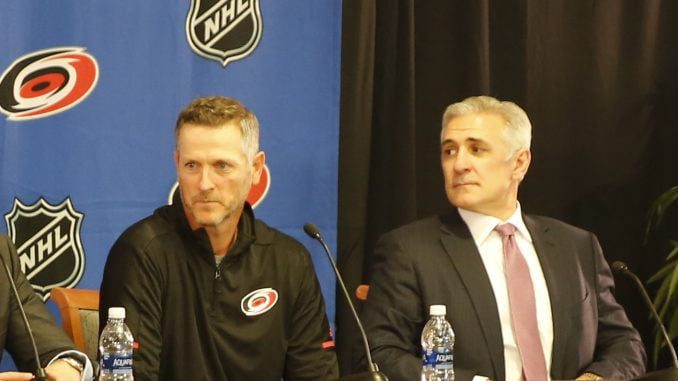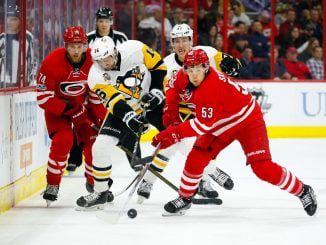
In Part 1 of North State Journal’s conversation with Tom Dundon, the new Hurricanes owner talked about the GM search — he plans to be back in Raleigh next week to conduct face-to-face meetings but said he’s been “working on this every day” while vacationing — and more. In the second half of the interview, Dundon answered questions about coach Bill Peters, the backlash at the owner for unseating Ron Francis, the need for change in the organization, and the frustration surrounding the team’s performance — from his own to the fans’ disappointment.
North State Journal: I asked Bill some pretty tough questions last night (Tuesday) about his job security, about a culture of losing being established, and if there’s something really fundamentally wrong with the team. Everything is ultimately up to you, but is a decision on his future up to the new GM and, like you said, that hierarchy that occurs when that new GM is hired, or do you anticipate making a change, if you make the change, before that GM is hired?
Tom Dundon: No. I think Bill’s focused on trying to win as many games as he can, and I’m focused on the organizational structure. I wouldn’t think it would make any sense at all to think about that. Everyone obviously knows we’ve got this GM process going, and until we have one I wouldn’t know their opinion on him. I think Bill’s trying to win games and he cares and he’s prepared and he’s going to show up every day and do the best he can, and that’s his job. My job is to go figure out who the GM’s going to be. And once those two things happen, we’ll all sit down and have those conversations. I’m not looking to blame anybody for anything, I just want to get better. We just all have to decide what gets us better.
NSJ: On that note, I asked Bill, “Does something need to change?” and he said, “That’s a good question,” and that was kind of the end of the press conference. Do you feel like there’s a need to change the makeup of the team? Is this a situation, you think, where you’re on the cusp on nine straight years — and obviously you haven’t been here for nine years — but does it feel like you are concerned about…
TD: Yes, things need to change. Yeah, that’s fair.
NSJ: Back to Ron for a second: Ron’s obviously an icon here, he’s an icon in Canada. Were you prepared for the backlash you got from kind of hockey people when they made the snap judgments about you saying — and I think it’s kind of fair to say Canada protects their own a little bit, and that comes from the Canadian media in some areas, too. Were you surprised that there was this snap judgment of “Tom wants to run things on his own.” Were you prepared for that immediate backlash that came with the decision with Ron?
TD: Yeah, you know, look: I was actually impressed by it because I think the fact that people care about the people they have relationships with and know and want to protect him, that seems perfectly reasonable to me and rational. Given the circumstances, I think I understand why people have their opinions and feel the way they feel. I don’t know if prepared or unprepared is the right word, but I totally understand the position. I’ve said repeatedly he deserves those kinds of emotions directed toward him because he’s a great guy, he’s a smart guy and, probably more than anything, I think that those responses are based on the information everybody has. That’s a reasonable position for people to take. All I can try to do is what I think is best and, hopefully, no one’s worse off for it, but it wasn’t something that I found troubling. I actually kind of liked the fact that the community rallied behind this guy because he deserves it.
NSJ: A move like that obviously sends some shockwaves through an organization. A couple people I’ve talked to just kind of off-the-record have indicated there’s a little bit of walking on eggshells about where things go from here. And that’s to be totally understood with — you know, you spent a lot of money to buy this team, it should be run the way you want it to be run. Do you think that’s good that people are — I don’t want to say on edge — aware that change is coming and it’s possible even for them? Either people are going to rise up or get out of the way.
TD: Yes. I think every day I’ve always lived with the uncertainty of how do you prove yourself today, how can I be better today. It’s a mentality that I want in the organization. It’s a mentality I want in life. And anyone who is confident in their own abilities and is willing to take on those challenges and is concerned about whether or not what they’re doing is their best and whether it can be better, I think those people are channeling their emotions correctly. If someone’s worried about — I think walking on eggshells is wrong because that implies that if you’re all-in and you do a great job and you’re willing to get better, that you’d still have a problem. I don’t think that would be the case. I hope everybody’s uncomfortable because they should be. But not because there’s a new owner, but because that’s the way you get better. You look at what you’re doing and you try to find a better way. Change isn’t comfortable. So, I don’t want people to live in fear, I want them to live in a constant state of how do we get better. And if you do a great job, then you’re an asset to the organization. Then if we are rational, then you have nothing to be scared of other than your own sense of how do I help, how do I make myself valuable today. I think everybody should be uncomfortable just because of the results we’re getting. I’m uncomfortable. I know it’s not good enough. Everybody knows it’s not good enough.
NSJ: Two months into this, has anything surprised you about this? Is there anything that’s different than what you expected or done in the past?
TD: I don’t know that I had a ton of expectations given that I didn’t have a lot of experience doing this, but I definitely believe that the same fundamentals that work in most organizations will work here. Which is, you know, you’ve got to find people who have experience and trust them, and then give them the resources and the structure to get the most productivity. So yeah, I think I’m surprised at the results of the team. I thought we would be better. But in terms of the long-term plan and how you give yourself the highest probability of success in the future, I think that’s about what I expected it to be. So short-term, yeah, I’m surprised we weren’t better. But long-term, I think we’ve got a pretty clear path to do the things we need to do to put ourselves in a better position in the future.
NSJ: You were met with a lot of enthusiasm from the fan base based on the previous ownership being a little detached. There’s probably justified frustration right now. What do you say to fans who are maybe at their wit’s end with the way this unfolded this season and even prior to you being here?
TD: They should be frustrated. Obviously, it’s very disappointing and frustrating. I know that we have to put in a better process and structure than we’ve got. What I don’t know is what that will lead to in terms of results. And these results aren’t good enough. I think we know we need change, the organization needs change, and now we’ve got to make sure that we make changes that are going to give us the right results and not just make changes because we’re not winning. And that’s the challenge of this process, is make sure we end up in a better place. We have to be better next year and the year after and the year after. I mean, the only thing to say is they should be upset. I’m upset. I think everybody’s upset. No one wants to lose. I promise you, the players and the coaches — people may not want to hear it, but they are all-in. I don’t have, and I don’t think they have, any regrets about preparation or effort. I think all the regrets are around the results. And I think it could be different than that, and it’s just not. That makes it a lot easier to feel like the things we need to do to build on what you’ve got here — it’s reasonable to believe we can do better because you’ve got a group of players and people that care. So now we just gotta figure out how to manage them in a way to get a better result.



